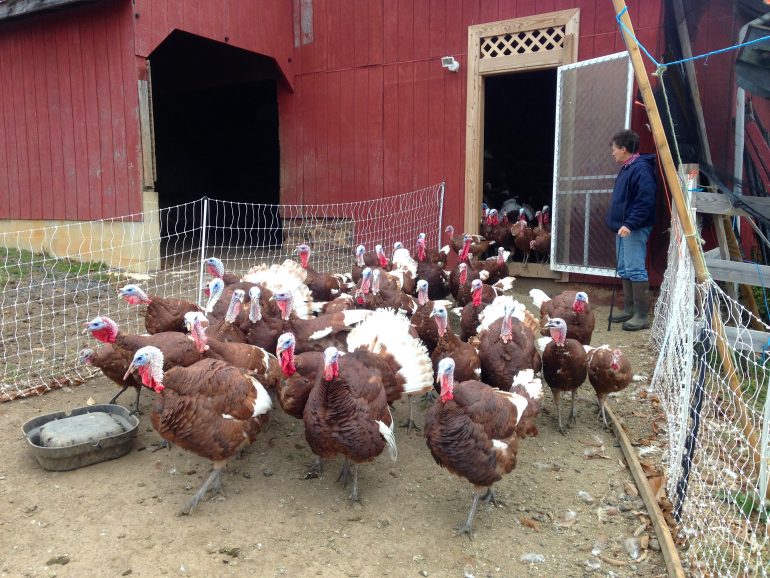JARRETTSVILLE, Maryland — Lee Swift’s Bourbon Red turkeys are loud, awkward-looking and quite ornery.
RELATED STORY: Not just chicken poop: Farmer leads effort to convert poultry waste to energy
Although part of her has grown attached to the birds — having raised them since they were 2 days old — “the way they’ve been terrifying me and the neighborhood, sometimes I’m not so sad to see them go,” Swift said.
On Thursday, she took about half of her turkeys to be butchered, bagged and sold to customers for Thanksgiving.
Even though she’s clipped their wings three times, the stubborn fowls still manage to fly the coop, escape the confines of their ample-sized pen and wander off to block the road or bother the neighbors.
And getting them back into their pen is no easy task.
“It’s like herding kittens, you just can’t,” said Swift, 57, owner of Chestnut Springs Farm in Jarrettsville, Maryland.

This is her first year raising turkeys, and Swift said she committed to treating them humanely and affectionately. She ordered them from Murray McMurray Hatchery in Iowa and received them two days after they were born in May.
Her Bourbon Reds, a specific type of heritage breed turkey, make much better Thanksgiving turkeys than others sold at the supermarket, she said.
Heritage breeds are closer relatives of wild turkeys than conventional, Broad-Breasted White turkeys that were bred by the poultry industry to grow quickly, gain weight and shed their feathers more easily so they could be efficiently raised on factory farms, said Julie Bolton, 56, owner of Groff’s Content Farm in Rocky Ridge, Maryland.
“Corporate turkeys,” as Swift calls them, can’t reproduce on their own and are bred through artificial insemination. Not only can heritage turkeys breed naturally, but they’re also heartier and better able to survive the winter, she said.
Because they take longer to mature, 24-28 weeks as opposed to about 16 weeks for a Broad-Breasted White turkey, heritage breeds cost more, Bolton said.

Bolton has been raising turkeys for about eight years and raises a mix of heritage breeds, like Black Spanish and Royal Palm, as well as conventional Broad-Breasted Whites, and she said it isn’t so much about the type of turkey, but how it is raised that affects the taste.
James Coleman, 55, market coordinator of the Riverdale Park Farmer’s Market, said he’s buying a heritage breed turkey for Thanksgiving this year because they taste the best, but more important to him is that the turkey lived a good life before it was killed.
“I would call it, just a more interesting flavor,” he said of the heritage breeds. “As long as I know how the farmer treated the bird, I don’t really mind what breed it is.”
This high-caliber meat does come with a higher price. Swift’s turkeys will go for $9 per pound, and with most customers requesting 20-pound turkeys, that’s around $180 a bird. At supermarkets, name-brand turkeys, like Butterball, are usually priced at under $3 per pound, she said.
“For a lot of people it’s very important to know what their food source is and that it’s high quality,” she said. “And they pay for high quality.”
Swift said she isn’t expecting to turn much of a profit her first year. She’s already invested around $7,000 total in feeding equipment, fences, shelter, food and the turkeys themselves. Her order of 100 turkey chicks cost her $1,300.
Since she bought them, she said, she’s lost six to illness, deformity and “pile ups,” a phenomenon that happens when the chicks get scared and pile on top of each other, sometimes smothering the ones on the bottom.

One week before Thanksgiving, Swift loaded 51 of her turkeys onto a truck to be taken to the butcher. Some of those remaining she’ll sell at Christmastime, she said.
She plans to keep four or five hens and a few toms, the term for male turkeys, for breeding next spring, and has already chosen a few she wants to keep as pets.
Showing a soft spot for the underdogs, Swift said she’s keeping the tamer, less aggressive ones who were bullied, like Redneck, a turkey named for the scars and scratches on his neck given to him by the others.
She is also particularly fond of Bluetail, a hen Swift grew close to while treating an ulcer in the bird’s left eye, and sometimes carries it around the field.
Swift said she plans to enjoy one of her turkeys with her family this Thanksgiving.
Interested customers can contact Swift by phone at 410-627-2637 or email, betterthanyouraverageturkey@
More information about Groff’s Content Farm is available here: http://www.groffscontentfarm.


You must be logged in to post a comment.